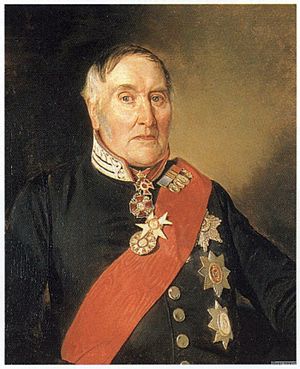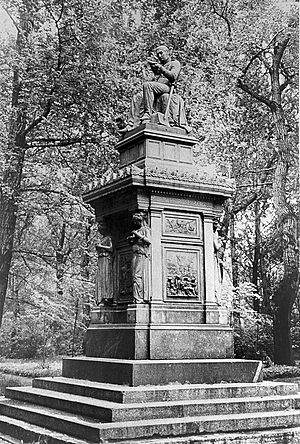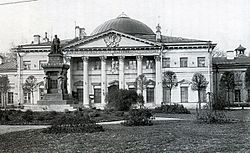Sir James Wylie, 1st Baronet facts for kids
Quick facts for kids
Sir James Wylie, 1st Baronet
|
|
|---|---|

Portrait of Wylie by Mihály Zichy (1841)
|
|
| Born |
James Wylie
13 or 20 November 1768 |
| Died | 2 March 1854 (aged 85) |
| Alma mater | University of Edinburgh, King's College, Aberdeen |
| Known for | one of the organizers of military medicine in Russia |
| Awards | Russian Empire Order of Saint Vladimir 2nd Class (1812) |
| Scientific career | |
| Fields | surgery, military medicine |
Sir James Wylie (known in Russia as Yakov Vasilyevich Villiye) was a Scottish doctor. He worked as a surgeon on battlefields and as a doctor for the royal family in the Russian Empire. He lived there from 1790 until he passed away in 1854.
He also led the Imperial Medical and Surgical Academy from 1808 to 1838. Many people see him as one of the most important people who helped organize military medicine in Russia.
Contents
A Doctor's Journey
James Wylie was born on November 13 or 20, 1768, in a place called Tulliallan in Scotland. He was the second of five children. His father, William Wylie, was a church minister.
After school, James became an apprentice to a local doctor. This means he learned medicine by working with an experienced doctor. In 1786, he went to the University of Edinburgh to study medicine. He studied there until 1789. He later earned his Doctor of Medicine degree from King's College, Aberdeen in 1794.
Starting Work in Russia
In 1790, James Wylie was invited to Russia by Dr. John Rogerson. Dr. Rogerson was a doctor for Catherine the Great, the empress of Russia. James started working for the Russian army as a senior surgeon in the Eletsky Infantry Regiment.
He was surprised that only officers received medical help. Many soldiers died from infections or diseases like malaria. Wylie worked as a battlefield surgeon in the Polish–Russian War of 1792. He also helped during military actions against the Kościuszko Uprising.
In 1793, Wylie was praised for treating malaria. He used a medicine he created called "Solution Mineralis." It contained tiny amounts of arsenic, which helped with the fever. He also performed amazing surgery, like removing a bullet from a soldier's spine. In 1794, he was promoted to staff surgeon.
A Doctor for the Tsar
After the war, Wylie worked in Saint Petersburg. He became very well-known and treated many important people. He reconnected with Dr. Rogerson, who was now the Empress's doctor.
Wylie performed successful operations on the Danish ambassador and saved the life of Count Ivan Kutaisov. Count Kutaisov was a close friend of Paul I, the Tsar. Because of this, Paul I made Wylie his personal surgeon in 1799.
When Paul I passed away in 1801, Wylie prepared his body. He also stated that the cause of death was a stroke.
Serving Emperors and Armies
In 1804, Alexander I (Paul I's son) asked Wylie to return to military service. He became the Medical Inspector of the Imperial Guard. Wylie was with the Tsar during the Battle of Austerlitz in 1805. He was one of the few people who stayed with the Tsar during the intense battle.
In 1808, Wylie became the President of the Imperial Medical and Surgical Academy in Saint Petersburg. He held this important position for 30 years.
Wylie was also made Inspector General for the Army Board of Health in 1806. In 1812, he became the Director of the Medical Department for the Imperial Ministry of War. During the Battle of Borodino in 1812, he performed about 80 operations right on the battlefield. He also cared for the badly wounded General Prince Pyotr Bagration.
In 1813, at Dresden, he had to amputate the legs of General Jean Victor Marie Moreau. The general's legs were shattered by a cannonball while he was talking to the Tsar.
Knighted and Honored
Wylie traveled with Alexander I to England in 1814. At the Tsar's special request, he was knighted by the Prince Regent (who later became King George IV). This made him Sir James Wylie.
He was also given the title of baronet by King George III. In 1824, the Russian government officially recognized his title. This made him the only baronet in Russia's history!
Wylie continued to serve the Tsar. He was with Alexander I at the Congress of Verona in 1822. He was also with the Tsar during his last trip to southern Russia, where Alexander passed away in 1825.
Later Years
After Alexander I, his brother Nicholas I became Tsar. Wylie continued to be a trusted doctor for the new emperor. During the Russo-Turkish War (1828–29), Wylie was 60 years old. He still took part in battles, leading the medical teams. In 1841, he was promoted to a very high rank in the Russian government.
Sir James Wylie became a very wealthy man. He passed away in Saint Petersburg on March 2, 1854. He was buried with full honors from the Russian Empire.
Helping Military Medicine in Russia
During the Napoleonic Wars in 1812, Russian military doctors worked in a very organized way. This system helped wounded soldiers get from the battlefield to hospitals for operations and recovery. James Wylie created this system.
When he first came to Russia, Wylie made it his goal to ensure all soldiers, not just officers, received medical care. Before him, many regular soldiers were left to die on the battlefield. Thanks to his hard work, the number of soldiers who died from illness in peacetime dropped a lot by the mid-1800s. This was a huge achievement! In those days, many soldiers died from diseases, so his efforts saved countless lives.
Wylie also wrote several books. These books were about topics like battlefield surgery, medicines, and diseases such as cholera and plague.
In 1823, Wylie started the Voenno-Meditsinskii Zhurnal (Journal of Military Medicine). This was one of Russia's most important medical magazines. Today, it is the oldest scientific journal in Russia that is reviewed by other experts.
Awards and Honors
Sir James Wylie received many awards for his important work.
From the Russian Empire
- A special diamond ring from Alexander I (1804)
- Order of Saint Vladimir, 2nd class (1812)
- Order of Saint Anna, 1st class (1814)
- Special tobacco boxes with diamonds and the Emperor's symbol (1826, 1828)
- Awards for his many years of excellent service (1828, 1834)
- Order of Saint Alexander Nevsky (1828)
- Order of Saint Vladimir, 1st class (1840)
From Other Countries
- Order of Leopold, 2nd class (Austria)
- Merit Order of the Bavarian Crown, Commander (Bavaria)
- Legion of Honour, Chevalier (France)
- Order of the Red Eagle, 2nd class (Prussia)
- Order of the Crown, Commander (Württemberg)
Remembering Sir James Wylie
James Wylie left a lot of money in his will. He had no wife or children, so some of his money went to his wider family. But he also left a huge amount of money (1.5 million roubles) to build a hospital. This hospital was connected to the Imperial Medical and Surgical Academy.
The hospital, made of five buildings, was finished in 1873. It was known as the Mikhailovskaya Baronet Wylie Clinical Hospital. Today, these buildings are part of the S.M. Kirov Military Medical Academy.
A monument to Sir James Wylie was built in 1859. It was placed in front of the main building of the Medical and Surgical Academy in Saint Petersburg. Later, in the 1940s, it was moved to the courtyard of the hospital he helped build.
James Wylie was even featured in a famous book! He was shown as a character in War and Peace, a huge novel by Leo Tolstoy.
His Written Works
Sir James Wylie wrote several important books and reports during his career:
- On the American Yellow Fever, St. Petersburg, 1805 (in Russian)
- Pharmacopœia Castrensis Ruthenica, 1808-1812-1818-1840 (in Latin) - This was a book about medicines used in the military.
- Practical Observations on the Plague, Moscow, 1829 (in Russian)
- Rapport officiel à Sa Majesté Impériale sur la valeur comparée des méthodes thérapeutiques appliquées dans les hôpitaux militaires et à Saint-Pétersbourg aux sujets atteints de la maladie épidémique dite le choléra morbus, St. Petersburg, 1831 (in French) - This was an official report about treating cholera in military hospitals.
- Description de l'ophthalmie qui a sévi parmi les troupes, St. Petersburg, 1835 (in French) - This described an eye disease that affected soldiers.
 | Valerie Thomas |
 | Frederick McKinley Jones |
 | George Edward Alcorn Jr. |
 | Thomas Mensah |



